News
ICI Assembly Addresses Economic and Industrial Impacts of Climate Change
- 26.07.2017
- News
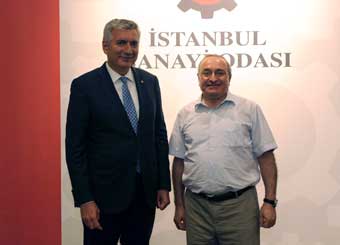
The Istanbul Chamber of Industry’s (ICI) ordinary assembly for July was held in Odakule on July 26, 2017 with the main agenda of “Impacts of Global Climate Change on Our Industry with Regard to Production, Sustainability, Efficiency and Competitiveness”. The assembly, moderated by ICI Vice President of Assembly Hasan Büyükdede, hosted Prof. Mikdat Kadıoğlu, a faculty member at Istanbul Technical University.
During his speech on the assembly agenda, Erdal Bahçıvan, ICI Chairman, said: “Unless we take relevant measures, we might run out of water, a required input for our industrial production,” highlighting that the drought and climate change-driven changes in rainfall patterns threaten water resources, one of the main industrial inputs.
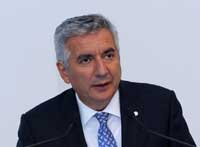
Erdal Bahçıvan, ICI Chairman
“The government, industrialists, and all relevant parties should take necessary measures. Domestic and renewable energy should be promoted, rather than opting for energy import, which is the main reason for high current deficit. Moreover, our industry should engage in a less energy-intensive production. The Internet of Things, artificial intelligence and big data technologies will enable a more efficient use of energy,” indicated Bahçıvan.
Delivering a detailed presentation on climate change, drought, and agriculture, Prof. Mikdat Kadıoğlu noted: “We need to start planning today for our agriculture in light of the long-term climate change. We have three suggestions for conservation of water. The first one is rainwater harvesting. We used to do this through cisterns. Secondly, we can conserve water by building greenhouses in dry regions. The last one is to reduce evaporation. Climate change will reduce water supply in Türkiye. Türkiye is warming and getting less rainfall. We are not looking at a tropical but a desert climate.”

Hasan Büyükdede, ICI Vice President of Assembly, delivered the opening speech at the Istanbul Chamber of Industry’s assembly meeting for July. Addressing the meeting’s main agenda in his speech, Büyükdede said:
“Due to climate change, we have been experiencing either too cold winters or too hot summers. Excessive rainfall is another result. Moreover, wind flow is hindered by the unplanned overbuilding, depleted soil ground, and faulty calculation of building areas in İstanbul. This is accompanied by methane emissions into the atmosphere from exhaust gases and dump sites, which makes it difficult to breath. Eventually, it is as if we cover our habitat with a blanket. Unless global warming is prevented, climate change will affect our lifestyle, efficiency, and industry. On this occasion, today, we will discuss the impacts of global climate change on the competitiveness of our industry.”
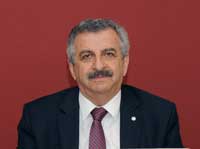
Hasan Büyükdede,
ICI Vice President of Assembly
Following his address, Hasan Büyükdede, ICI Vice President of Assembly, invited Erdal Bahçıvan, ICI Chairman, to the floor for him to share his views on the agenda. Bahçıvan started his speech by noting that global climate change causes warming of the earth, changes in rainfall patterns, decline in biodiversity, and depletion of natural resources. Bahçıvan remarked that disastrous sudden and heavy downpours, just as the one witnessed in Istanbul last Tuesday, has an adverse impact on daily life.
Indicating that the Global Risks Report 2016 published by World Economic Forum, an agenda item of previous assemblies, reports climate change as one of the top threats in comparison with the past findings, Bahçıvan stated that climate change-driven water crises, food shortage, limited economic growth, migrations, and increased security risks have a negative impact on the economy.
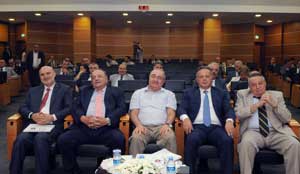
Adding that natural destruction threatens, on the other hand, the sustainable use of energy and raw material resources, the two key inputs for the industry, Bahçıvan emphasized that cost of production inputs, first and foremost energy, are on the rise while resources are in decline.
As an example for the threats against the industry, Bahçıvan pointed out that the drought and changes in rainfall patterns caused by the climate change resulted in a reduction of water resources, one of the most important industrial inputs, and unless any measures are taken, we might run out of water to be used in the industrial production.
Bahçıvan stressed that unless we take solid measures against climate change risks, the resulting impacts will unfairly fall on future generations, adding that while meeting today’s needs, resources should be used without decreasing those of the next generations. Bahçıvan also noted that adopting a sustainability-oriented vision for our business and lifestyle in consideration of the next generations is more critical than ever.

Bahçıvan underlined that achieving a sustainable lifestyle would definitely call for an overall makeover in the mindset. Noting that the society will not be able to continue producing and consuming as it does today, Bahçıvan said that there is an imperative need to transition to sustainable, ecofriendly, efficient and competitive production.
Bahçıvan continued as follows:
“U.S. withdrawal from the Paris Climate Agreement in early June has led to new inter-governmental arguments and new polarizations. The U.S. claim that the Paris Agreement puts the country at a disadvantage while providing economic benefits to other countries. Europe, China, and India, on the other hand, adopt a rather collaborative approach, stating that they would remain committed to the accord. China and India have been achieving remarkable successes in renewable energy, while working to slow down their coal-based power production, which constitute the main reason for air pollution in their countries. To clarify this with an example: China has already broken ground for the construction of the first energy self-sufficient “forest city” to house 30 thousand people. Such innovative moves that will transform the understanding of urbanization and energy supply will be effective in the economy and the industry in the upcoming period.”

Noting that European countries take similar measures as well, Bahçıvan informed that the U.K. plans to gradually transition to clean resources for electricity generation by 2025. Emphasizing the importance of remaining sensible about climate change, Bahçıvan added that they should however not ignore the criticisms brought to the international climate agreement.
Indicating that the criticisms center around economic imbalances, Bahçıvan informed that more than half of global greenhouse gas emissions can be traced to just 25 companies, and only 100 companies are responsible for 71 per cent of the gas emissions. Therefore, Bahçıvan underlined that it would be unfair to put equal responsibility on all countries regarding the climate change. Noting that after all the destruction caused, it would be unjust of developed countries to hold back only developing countries under the pretext of climate change, Bahçıvan reminded the importance of tackling the issue of climate change in a fair environment that protects the competitive power of Türkiye and other countries.
Noting that Türkiye has a relatively high current deficit, which is basically driven by energy import, Bahçıvan said that domestic and renewable energy should be promoted in consideration of the fact that only one fourth of the energy supply comes from domestic production. Bahçıvan also noted that the industry should perform less energy-intensive production, underlining the importance of domestic and national resources.
Bahçıvan continued as follows:
“Technological developments offer new opportunities in this regard: In the upcoming years, the Internet of Things, artificial intelligence and big data technologies—results of the digital transition that will drive a radical transformation in the manufacturing industry—will certainly enable more efficient use of energy. Briefly, science and technology are key to achieving resource and energy efficiency in our industry. Our industry should increase its efficiency and competitiveness by turning environmental threats into opportunities through suitable technologies and clean production practices. This understanding should be applied for the entire production process. I am proud to share that the Istanbul Chamber of Industry, the founder of the first branch in Türkiye whose name includes the word “environment”, has the adequate knowledge and experience on environment and climate. We, as a chamber of this mindset, have always defended an environment-friendly and nature-focused production approach, and will continue to do so.
Taking the floor after Mr. Bahçıvan, Prof. Mikdat Kadıoğlu said that the average temperature of the earth drops and rises by 1 degree every 150 thousand years. Noting that the earth has warmed 1 degree over the last 150 years alone, Kadıoğlu said that the blame is on humans. Indicating that one of the most serious problems is dry winters, Kadıoğlu stated that half of the rain falls during the winter and the impacts of winter rainfall decline would be felt throughout the year. Kadıoğlu noted that the global temperature would go up by 2 degrees due to climate change, which means 15 times rise in extreme values.
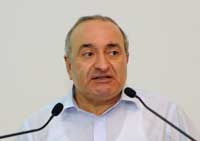
Prof. Mikdat Kadıoğlu
Explaining that climate change will cause critical sociopolitical developments, Kadıoğlu said that both the Kyoto Protocol and the Paris agreement are most defended by the European Union, which is driven by the concern of potential waves of migration from the South Africa. Kadıoğlu also indicated that snowfall has declined by 15 percent, another problem resulting from the warming. Highlighting that snow water is accumulated as reserves in certain areas, helping the protection of the flora and feeding into the groundwater gradually, Kadıoğlu stated that the dam and groundwater in the East Anatolia are not fed enough due to the decline in snowfall.
Informing that the number of floods, droughts, hails and lightnings have tripled since the 1960s, Kadıoğlu noted that Istanbul is also threatened by a potential earthquake, which will cause 30 percent loss of the GSYH according to a scenario. Indicating that disaster management is misinterpreted in Türkiye, Kadıoğlu underlined that it actually means anticipating the risk and minimizing it to a manageable level.
Highlighting that flood is a serious disaster today, Kadıoğlu stated: “In the past, flood meant overflow for us. Now, on the other hand, even dry areas are flooded. Urban flooding has become a big problem across the world. It is especially problematic in old settlements. In our country, the difference between a stream bed, a floodplain and a flood danger border is not known. If a building can be constructed earthquake-resistant, it can then be made flood-resistant as well. There are three types of floods: Slow onset floods, fast moving floods, and flash floods. Flash floods are increasing because of the climate change. We do not know stream beds. We have built roads on streams. We have built streets. Our problem is that we do not learn from our mistakes. We do not change ourselves while the climate changes. We do not anticipate the changing climate. We act by rote.”
Indicating that scarce water is as serious a problem as excessive water, and drought has become an important disaster, Kadıoğlu said that drought is not officially accepted as a disaster in Türkiye. Having stressed that, in contrary to what most public agencies accept, there are not any stable cycle related to drought that repeat itself every several years, Kadıoğlu noted that Türkiye is currently suffering from water stress and will turn into a country experiencing water scarcity by 2030 and drought by 2050. Kadıoğlu stated, “Climate change will reduce water supply in Türkiye. Türkiye is warming and getting less rainfall. We are not looking at a tropical but a desert climate.”
Underlining the importance of virtual water which is used for the management of water, Kadıoğlu remarked that in Türkiye, 80 percent of water is consumed in agriculture, and especially in cotton production, dam and ground water is used instead of rain water. Kadıoğlu described groundwater as a strategically relevant type of water, which therefore needs to be conserved and saved for difficult situations, yet Türkiye uses it in cotton production. “We need to start planning today for our agriculture in light of the long-term climate change. We have three suggestions for conservation of water. The first one is rainwater harvesting. We used to do this through cisterns. Secondly, we can conserve water by building greenhouses in dry regions. The last one is to reduce evaporation,” Kadıoğlu said.
Kadıoğlu also added that they want to raise awareness among industrialists with the slogan of “Use water wisely, it might be necessary for YOUR INDUSTRY”. Kadıoğlu noted that in the upcoming period, the rainfall would decline, it would take longer to grow plants, evaporation and transpiration would rise, hydro-meteorological disasters would be seen more often, thus everyone should be prepared. Kadıoğlu also highlighted that all related efforts and technological investments would also create employment and a source of income, and concluded his remarks on an endnote: “We should manage risks, not damages.”
Following the speeches, ICI Assembly Members took turns to deliver their accounts of the global climate change. Additionally, Prof. Mikdat Kadıoğlu answered ICI Assembly members’ questions on the meeting agenda.